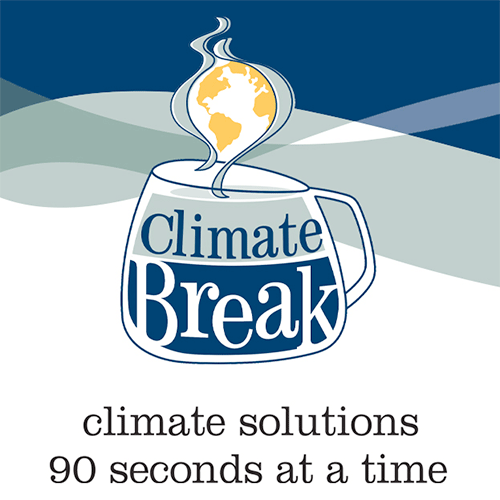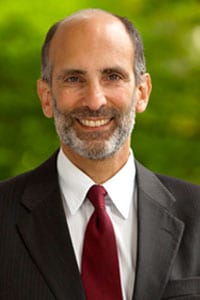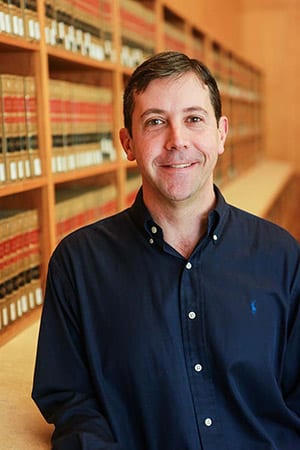By Gwyneth K. Shaw
 The issue of global climate change can feel overwhelming: It’s an enormous problem with huge consequences, and a seemingly endless array of obstacles stand in the way of fighting it.
The issue of global climate change can feel overwhelming: It’s an enormous problem with huge consequences, and a seemingly endless array of obstacles stand in the way of fighting it.
Ken Alex and Ethan Elkind, both leaders at Berkeley Law’s Center for Law, Energy & the Environment (CLEE), wanted to help break people out of the doom-and-gloom loop, and bring a touch of optimism to their media diet on the topic. So they created the “Climate Break” podcast, which offers a bit of problem-solving and research in under two minutes per episode.
CLEE fosters innovative approaches to the planet’s biggest environmental and energy challenges through four flagship projects — Climate, Water, Oceans, and Land Use — and develops solutions by harnessing the expertise of Berkeley Law’s community and partners around the globe.
“Climate Break” extends the center’s considerable reach even further.
“It really grew out of the problem of communicating climate change, and trying to think about different ways to get across the set of issues, but also not to drive people to drink. One of the things that I noticed with climate change coverage is that most of it — I would say 90% of it — is really about the impacts of climate change, and kind of the parade of horribles that are coming down the pike,” says Alex, the director of CLEE’s Project Climate.

“I really wanted to focus on solutions, and to put them into bite-sized pieces, so that people could say, ‘Oh, there are things that are happening that are hopeful.’”
Alex and Elkind immediately knew they wanted each podcast installment to be short, and they’ve played with the length, including longer takes when a guest warranted it. But after more than three dozen episodes, “Climate Break” has mostly stuck with the original concept: A quick hit of knowledge designed to spur listeners to click over to the show’s website for more in-depth information.
Elkind, director of CLEE’s Climate Program, is the host. He and Alex enlisted students from Berkeley Law, the Haas School of Business, UC Berkeley’s Graduate School of Journalism, and undergraduates to help research and produce the show in house.
The show’s guests — including former California Gov. Jerry Brown and former UC President and U.S. Department of Homeland Security Secretary Janet Napolitano — have come from a variety of streams. They start with the contacts of Elkind and Alex, who have been working and researching in the field for years.
“The beauty of doing a program like this is everybody’s happy to talk about what they do, so we haven’t really had anybody who said no to an interview,” says Alex, who spent eight years as a senior environmental advisor for Brown and has what Elkind called “an amazing Rolodex.”
A broad range of voices
Students on the “Climate Break” team have unearthed many of the other guests, and the mix of policy makers, researchers, and activists make the short episodes vibrant. Whatever you’ve read, watched, or listened to about climate change, you’ll learn something, whether it’s about agroecology or, most recently, how feeding cows seaweed might help cut methane emissions.

“The students have a whole different perspective on this, and they’ve helped put us in touch with certain professors on campus who we didn’t even realize were doing some interesting climate related research,” Elkind says. “So it’s been an opportunity for us to get to know some of the different academics across campus, and maybe help knit together some of that research. The students are also often more knowledgeable about the more local stuff happening, especially activism among younger people.”
The next step for the show is growing its audience. It’s already available on Apple Podcasts, and Alex and Elkind hope to work with public radio stations, and perhaps television stations as well, to broadcast the segments.
The public radio angle was one of the rationales for the short episode length to begin with, so that “Climate Break” bits could fit in between longer shows. They’re also considering adding short videos to the show’s portfolio.
Alex and Elkind say they’re pleased with the breadth of what the show has been able to cover, and from the way a new platform has helped them see climate change from a fresh perspective, including that of the students on the team. Most of all, they say, the project has been fun.
“I’ve learned a ton from doing these interviews,” Elkind says. “It’s been really inspiring to hear about all the great work that’s happening — including in some surprising places — and about all the little solutions and the ingenuity that’s being unleashed, to try to problem solve.”